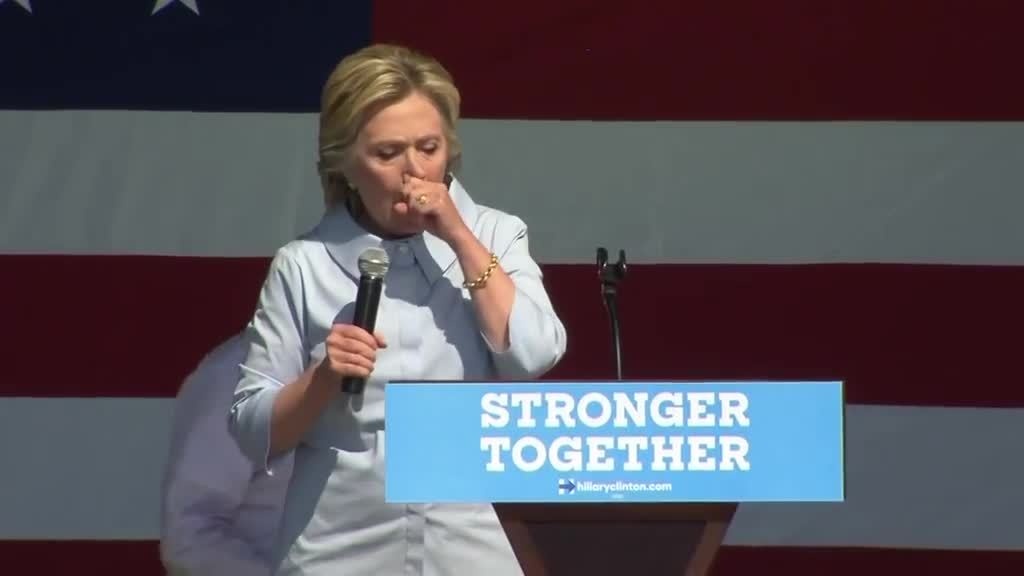Leading presidential candidate Hillary Clinton recently didn’t tell an adoring mainstream media that she was sick—very sick—until she had to sit down at an event because she was dehydrated. Clinton, a senior citizen in her 60s, recently had to leave the campaign because she was suffering from pneumonia, even though she had unilaterally decided that she didn’t need to disclose her health problems.
When asked later by reporters why she didn’t admit the problem, Clinton said, “I just thought it was no big deal.”
No big deal?
Pneumonia kills old and young every day of the week, especially those in Clinton’s age bracket. She is now “fit” and in good shape to campaign for the president, according to her physician. So Democrat Hillary Clinton says her pneumonia was not even important enough to mention.
De veras, senora?
Clinton’s Republican challenger, Donald Trump, also is in the self-assessment business and claims that he’s in great shape. That’s even though he, the same as most Americans, is chubby (America in 2016 is a place where pay one price and eat all you want restaurants are a can’t miss proposition. I just got a proposal from Olive Garden to eat as much pasta as I want for a low price). Trump recently went on the Dr. Oz show, thrusting a few test results in the doctor’s hands. Even though he’s 6’3, 240 pounds, Trump says the tests prove that he’s in great shape. (Sure, and even though I’m married to the ever comely Suzanne Hall, I’ll be going out on dates with Cindy Crawford. Be sure to watch this space for Gregorio’s night on the town with Cindy).
Trump says, even though he is 70, he is actually 35.
De veras, senor?
Obesity can lead to a host of diseases, including diabetes and heart disease.
Whose Holding that Stethoscope?
Are the two top presidential candidates, who are relying on the words of the physicians they choose and the release of selective medical data of their own choosing, misleading Americans about their health?
If so, it wouldn’t be the first time. The problem is presidential candidates, and even presidents, can selectively release information just as they can selectively avoid debating or holding regular press conferences since there is no legal obligation to do any of this.
They are not obliged to use independent physicians. This “I’ll decide if and when to release medical information” system has been going on for generations. In one case, it resulted in the American people, toward the end of World II, re-electing a president who was popular but very sick. Indeed, only a few insiders knew that President Franklin Delano Roosevelt (FDR) would never survive a fourth term. However, at the same time that he was making vitally important decisions during WWII, his physician was telling the public that FDR was in good health. This is in a new book, “The Final Battle: The Last Months of Franklin Roosevelt,” by Joseph Lelyveld. FDR’s personal doctor, Admiral Ross McIntire, said, when FDR was suffering from a cold, that the president would be “good as new in a day or two.” Less than a year later he was dead.
Indeed, this wasn’t even a case of FDR, who was also in his 60s, being a little ill or feeling the effects of aging. In fact, FDR, by 1944, was a shipwreck. To prove what I say, just look at photos of him at Yalta in January 1945, sitting alongside of Joseph Stalin and Winston Churchill, negotiating important post-war agreements.
Americans Misled
FDR’s daughter, according to the book, insisted that an outside doctor examine the president. He concluded that FDR’s condition was “God awful.” He also said that FDR, who to this point had never seen a cardiologist, had “a diseased heart.” It had “become enlarged and shifted away from its normal location in the chest.” FDR’s blood pressure was an incredibly bad 186/106. The doctor said FDR had “acute congestive heart failure.” All of this was kept from the American public in 1944.
In that election, the choice of a vice presidential candidate became vitally important. That’s because in 1944 FDR’s vice president would surely be president, which is what happened a few months into FDR’s fourth term. By the way, in 1944 FDR removed then vice president Henry Wallace, who had been vice president for eight years, and replaced him with Senator Harry Truman, who would serve as president for some seven years.
What’s to Be Done
Americans were misled 72 years ago and the same may be happening today over the state of the health of major presidential candidates. Just as I believe that candidates should be required to debate—-and I think there should be much more than three—and hold regular press conferences, so should they be required to submit to several physicals and by doctors most definitely not of their choosing.
I would say that all presidential candidates—let’s say anyone who is on the ballot in at least 40 states—should be legally required to be examined by the Surgeon General or some independent medical authority unaffiliated with any political party. I would suggest that the examinations take place just after a candidate is nominated, a second time around Labor Day and a third time in mid-October, just a few weeks before the election in November. The results should be immediately available to all news organizations and they should be published online so anyone can decide about a candidate’s health. Going on the Dr. Oz show or providing a self-assessment is no more enough than yours truly telling you that I am a strikingly handsome 63-year old Bunkerland resident who really looks half his age.
A skeptical, sharp person should say to me what all of us should say to our pols who make heated promises on the hustings about everything under the sun and claim they are healthy beyond belief: Prove it.
![]()
